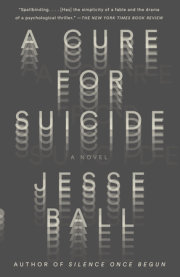Danvers vs. Masconomet Two minutes into the second half, Masco’s #19 took an indirect shot on our goal. For a moment we lost sight of the ball in the scrum of players huddled in front of the net, the air blurry with sticks as if a hundred defenders were trying to clear it and a hundred others were trying to score. Considering how the first half went down, there really wasn’t any reason for those of us on offense to keep watching, our defense porous as a broken window. True, our opponents, the Masconomet Chieftains, hadn’t officially put it in the net, but it was a foregone conclusion, the ball already as good as in, another Masco goal adorning the scoreboard. Girl Cory turned and started the humiliating trek back to midfield. A few of us began to follow.
“Come on, guys,” pleaded Abby Putnam as she watched our offense retake its positions on the center line, readying ourselves for yet another back pass that restarts play after a goal. “Masco hasn’t even scored yet.” No sooner were the words out of her mouth than the ball found daylight, shooting out of the throng and right through our own Mel Boucher’s heavily padded feet.
Abby hung her head, temporarily deflated. An empty potato-chip bag went sailing by, a tumbleweed in the wind. Quickly she pulled herself together and jogged back to midfield where the rest of our offense was already waiting, our forward line fanning ourselves with our sticks like a flock of overheated southern belles.
“Come here often?” offered Jen Fiorenza snidely from her position at left forward, but we were all too tired to tell her to cram it.
The Chieftains didn’t even cheer. It was 92° in the shade. If we could’ve rolled over and offered our throats, our pale underbellies flashing in the July sun, we would’ve, each of us a white flag. There were twenty-eight minutes of play left. It was hard to know who was having less fun—us or them. Mel Boucher stood in the goal, whacking the earth with her stick like a guitar god trashing his Stratocaster. Even at midfield you could hear what we knew by then was a string of invectives pouring out of her helmet.
Tabarnaque! Je m’en câlisse! All first half Mel had been complaining about the sun being in her eyes, but we’d switched sides at halftime, so now it was God’s fault.
“Baptême!” she shouted. From the looks of it there was a girl on the other team who was also French Canadian. You could tell by the smirk on her face. The referee just looked puzzled, unsure of whether or not she should throw a yellow card for sportsmanship, though honestly she wasn’t sure what she was hearing.
Why had we thought this year would be any different? Wasn’t that the very definition of insanity—standing around with our sticks in the air, not marking our man, playing everything but the angles, yet expecting things to be better, the ball effortlessly sailing into the opponent’s net? Usually when people talk about tradition, they mean the good things people pass down to whoever’s around to take up the mantle. Usually “tradition” doesn’t refer to stuff like whole seasons without a single win, or untold handfuls of broken fingers, split lips, or the time the bus got a flat on the way home from an away game double-digit drubbing and we sat by the side of Route 1 for the better part of an hour inhaling the world’s exhaust.
It was Monday afternoon, our first full day at Camp Wildcat on the University of New Hampshire campus, this atrocity our first scrimmage of the week. There would be other scrimmages every afternoon, other chances to have our asses served to us on a silver platter with a sprig of garni. Had we each really paid $375 to live in the dorms and spend our mornings doing burpees, our afternoons being publicly gutted? We were down 6-0 thirty-two minutes into play. By the time we finally scored at the fifty-five-minute mark, Masco was playing their third string.
Only Abby Putnam let out a halfhearted cheer as her shot hit the back of their net. You had to hand it to her—she had team spirit.
Be. Aggressive. B-E aggressive. You couldn’t be a Putnam and live in Danvers and not be a believer, even when every other rational marker said
don’t. Apparently the Putnams were just born like that. They had a way of latching on to a story and not letting go no matter what, like a terrier with a rabbit. Abby was still in high spirits from last year’s season when we went 2-8, our best record in more than a decade. “We could go all the way to States this year,” she told Sue Yoon on the drive up to Camp Wildcat. Abby was sitting in the passenger seat, peeling her third banana of the day. About the only thing in life Abby Putnam feared was low potassium. “We’re seniors,” she added. “It’s our time.”
Sue Yoon flicked her Parliament out the window. Her hair was dyed Purplesaurus Rex, the artificial flavors in Kool-Aid coloring her locks a subtle shade of lilac. “Who do you think we are?” she said, the smoke vortexing out her nose. “The Bad News Bears?”
It was a good question.
The Bad News Bears had come out in theaters more than a decade before, but it was the only sports movie we could name featuring a group of ragtag misfit kids. None of the other passengers in Sue’s pink Volkswagen Rabbit dubbed the Panic Mobile said anything. Maybe if one of us had given it a little more thought, things wouldn’t have gone down the way they did. Ancient urges which should’ve been snuffed out long ago wouldn’t have been unleashed. But sometimes objects in a mirror are closer than they appear. When you don’t speak up, you get what you get.
That afternoon at Camp Wildcat as Masconomet was annihilating us brick by brick, we were eight months past having gone 2-8, and only Abby Putnam still openly admitted to wanting to be team captain come fall. At the end of halftime, just before retaking the field against Masco, we huddled up and hit the ground three times with our sticks. “Field field field,” Abby yelled.
Only a couple of us responded, the optimists and the overly polite, folks like Amy “Little Smitty” Smith and Julie Kaling and maybe AJ Johnson and Boy Cory. “Hockey hockey hockey,” they intoned more out of kindness rather than any innate hunger to win. The rest of us just kept our mouths shut.
Thirty minutes later we were out of our misery. The officials couldn’t even agree on the score. One claimed it was 8-1, the other 9-1. “Field field field,” screamed Abby, trying to gather us together for one final moment of bonding, but nobody answered, our minds already on showers and whether or not the soft-serve machine was fixed in the cafeteria.
“Nice game, ladies,” said Pam, the UNH senior assigned to be our coach. Real coaches weren’t allowed at camp, so players on the UNH collegiate team acted as such. Though we’d been thoroughly pounded by Masco, Pam had the same pleasantly surprised look on her face she always sported, like someone who’d scored a C+ on a test when at best they’d been hoping to land a D. Jen Fiorenza said Pam was stoned fifty minutes out of every hour. She said you could tell by the monstrous leg brace holding Pam’s knee together, her meniscus allegedly shredded like pulled pork, and by the way she washed back small pink pill after small pink pill with a Tab that’d been sitting out in the sun all day, how ten minutes later her face would melt into an expression of sheer boneless bliss.
“My aunt’s like that,” said Jen. “You could set her hair on fire and she wouldn’t even blink.” By “aunt,” we knew Jen was really talking about her mom.
Newly defeated, we spit out our mouth guards and ripped off our cleats, untaped our wrists. In twos and threes, we slugged back to the dorms through the late-afternoon air, the White Mountains’ humidity like dog stew. The cafeteria wouldn’t open up for another hour. When it did, Heather Houston would ladle out her third bowl of Cap’n Crunch for the day, at this point not even bothering to hide it under a plateful of salad. After dinner, the whole camp would probably watch some old tape of an Olympic game. If we were unlucky, the UNH head coach, Chrissy Hankl, might swing by and share with us a few inspirational clichés about unity, her baby-blue sun visor perfectly in place even though it would be well past nine, the sun long down behind South Mountain. Then bedtime, wash, rinse, and eight hours later repeat.
The morning sessions were mostly about conditioning. The camp planned it that way. First thing after breakfast before the heat got too bad we ran suicides. In the weight room we pushed through a series of wall sits, the room painted shiny with our back sweat. During the morning sessions they kept us together—freshmen, JV, and varsity, more than fifty teams from all over Massachusetts and New Hampshire running around with zinc on our noses. Afternoons we broke up into teams to scrimmage. Nights we watched tapes of games. Late night some of us snuck out to the fields to smoke. Late, late night some girls from Watertown tried to defect over to the dorms where the boys’ football camp was staying, but when they knocked on a random door, a girl answered brandishing a lacrosse stick.
The night we got demolished by Masco, Coach Hankl and her sun visor didn’t make an appearance at our video viewing. There were no old tapes of the bronze-medal match between Scotland and East Germany. Instead, we gathered in a run-down auditorium with the stuffing coming out of the seats and watched an instructional video about sportsmanship. It was the end of the ’80s, 1989 to be exact. Our parents hadn’t learned yet to scream at the referees, to shout things at the other team like,
kill her, take her down. In the video, two teams form single-file lines on opposite sides of the field, then walk past one another, each girl saying something nice to the other girl as they high-five.
Good game. Nice hustle. Good stickwork. One girl even says to her opponent,
I like your eyeliner. “What is she, a lesbo?” someone from the Greenfield team yelled. People sniggered. None of us knew any girls who were gay, or so we believed. When things went down later, Catholic martyr Julie Kaling said she thought only boys could be gay, and we razzed her for it, which was pretty mean, considering. Then the video started to get shaky, and pressing the tracking button didn’t help, and when one of the counselors finally hit eject, the tape got stuck in the VCR, and the team from Greenfield cheered.
And that’s what happened on Monday in the third week of July 1989, at the UNH Wildcat Field Hockey Camp. To recap: We got trounced by Masconomet. Heather Houston’s pupils were starting to look like magnified nuggets of Cap’n Crunch behind her 20/200 glasses. The soft-serve machine was still out of service.
I like your eyeliner became the camp wisecrack. Mel Boucher got scored on a whole bunch and decided to look outside the box for some much-needed divine intervention.
And that made all the difference.
Psychologically, a goalie can only take so much, even a French Canadian one from a family of Catholic males. After she got scored on eight or nine times, Mel stormed back to her dorm room and took matters into her own hands. She got to work, ripping out the used pages in the notebook she’d gotten for her birthday, the one with the picture of Emilio Estevez printed on the cover, her parents secretly hoping Emilio’s boy-next-door appeal might guide their tomboy daughter gently into the right port, so to speak. Years later she would try to explain why she did it by saying that sometimes the Lord is busy and He needs us to be self-starters, show a little moxie.
But this is only the beginning of our tale. For now, let’s just say that Mel and her moxie made some new friends in low places. And thanks to the dark pledge Mel scribbled down in Emilio, for the rest of the week, the wins would come rolling in. Case in point: the very next day in our scrimmage against the Merrimack Valley conference juggernaut Andover, we battled to a 1-1 draw.
Sacré bleu! To go from 8 or 9 to 1 to a tie against a perennial powerhouse was unheard of. Suddenly heads everywhere began exploding. Girls on the other teams started to mimic us, desperate to go from zeros to heroes as fast as we did in the course of a single afternoon. The cafeteria couldn’t keep the Cap’n Crunch stocked fast enough.
Our secret? Over the course of the week, alone and in pairs, each of us made the grim pilgrimage to Mel’s second-floor dorm room and signed our names in her battered notebook, each time Emilio Estevez and his chipmunk cheeks staring straight into our souls. And with every new signature, Mel would cut another thin blue strip off one of her old stretched-out athletic socks and tie it around our arm just above the muscle where we could keep it hidden under our shirtsleeves, the sock a secret sign of our allegiance to what Heather Houston simply called “an alternative god,” the whole lot of us suddenly running around like junkies with our arms tied off.
And that’s all it took for the proverbial worm to turn. We didn’t even have to believe in what Mel via Emilio was selling. Looking back at those early days, it was just kid stuff. All we had to do was keep our sticks on the ground and mark our man and yell
hockey hockey hockey when the time was right and keep our mouths shut about the whole thing, all the while disregarding the insatiable hunger that was silently growing inside each and every one of us like a tumor. What could possibly go wrong? We were an eleven-man bevy of newly empowered teen girls. Abby Putnam was right. It
was our time. Every three hundred years or so, our kind gets loosed upon an unsuspecting world. And this time around, the history books would know us as the 1989 Danvers High School Women’s Varsity Field Hockey Team.
Be. Aggressive. B-E aggressive. Tuesday after our 1-1 tie against mighty Andover, while still padded up, Mel Boucher lowered herself down on one knee in the goal and bowed her head. This time only silence came pouring out of her helmet. The officials were still adding things up, but it looked like she had made an unbelievable fifty-two saves in net. Fifty-two saves coupled with Abby Putnam’s one goal and suddenly Camp Wildcat’s biggest losers were the talk of the town.
That night after dinner and more bowls of Cap’n Crunch, we schlepped to the auditorium for some videos about hand position and defending and attacking off corners. Toward the end of the evening Chrissy Hankl appeared with her trademark baby-blue sun visor. There was a rumor going around that her hair was attached to it. “Ladies,” she said.
“Apparently the chick doesn’t know us,” whispered AJ Johnson to Becca Bjelica.
“No duh,” replied Becca, as she pulled up her bra strap.
“I’m pleased to announce that a new camp record was set today,” said Coach Hankl. Then she called Mel up onstage and handed her a piece of paper with a pair of field hockey sticks crossed like a shield over some gibberish about excellence. Afterward, we noticed the certificate wasn’t printed on heavy card stock or anything, but we were still happy for her.
“I’ll have what she’s having,” joked Sue Yoon, quoting everyone’s favorite new movie line of the summer from
When Harry Met Sally, which they weren’t carding for at the mall, although it was rated R.
Mel shot us a sly wink from the stage, which was surprising because the Mel Boucher we knew was more likely to accidentally wink with both eyes. In the low wattage of the auditorium, her all-American Québécois complexion looked radiant as any seraphim come to deliver the good news. And it
was good news. For a team that most recently had posted a 2-8 record, it was wicked good news. Who knew? You scrawled your name in a book and tied yourself up like a pot roast with a piece of smelly blue tube sock and
voilà! The world was your oyster. Mel was our very own archangel of darkness. In time, we were all having what she was having. Even Abby Putnam signed on after some initial sputtering. And what Mel Boucher was having was nothing the Judeo-Christian world we inhabited would have smiled on approvingly.
See, it turns out all those long dark hopeless seasons, we’d been putting our chips on the wrong god. Honestly, of all places on earth, the Town of Danvers should have seen us coming.
Copyright © 2020 by Quan Barry. All rights reserved. No part of this excerpt may be reproduced or reprinted without permission in writing from the publisher.

































































































